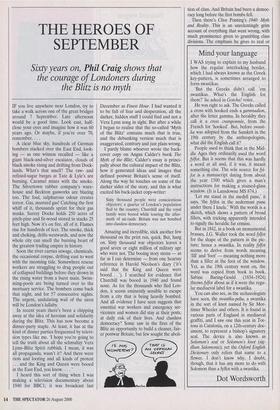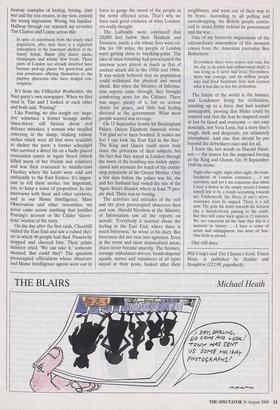THE HEROES OF SEPTEMBER
the courage of Londoners during the Blitz is no myth
IF you live anywhere near London, try to take a walk across one of the great bridges around 7 September. Late afternoon would be a good time. Look east, half- close your eyes and imagine how it was 60 years ago. Or maybe, if you're over 70, remember. . . .
A clear blue sky, hundreds of German bombers stacked over the East End, look- ing — as one witness recalled — like a giant black-and-silver escalator, clouds of black smoke rising and drifting from Dock- lands. What's that smell? The raw- and refined-sugar barges at Tate & Lyle's are burning. Caramel mixes with the smoke. The Silvertown rubber company's ware- house and Beckton gasworks are blazing too. The foul, sulphurous odour creates terror. Gas, mustard gas! Catching the first whiff of it, thousands sprint for their gas masks. Surrey Docks holds 250 acres of pitch-pine and fir-wood stored in stacks 25 feet high. Now it's on fire, all of it. Flames rise for hundreds of feet. The smoke, thick and choking, drifts westwards, and now the whole city can smell the burning heart of the greatest trading empire in history.
Soon the river carries sewage, chemicals, the occasional corpse, drifting east to west with the incoming tide. Somewhere rescue workers are struggling to drag people out of collapsed buildings before they drown in the rising water from a burst main. Swim- ming-pools are being turned over to the mortuary service. The bombers come back that night, and for 57 consecutive nights. The urgent, undulating wail of the siren will be London's lullaby.
In recent years there's been a chipping away at the idea of heroism and solidarity during the Blitz. This has now become a dinner-party staple. At least, it has at the kind of dinner parties frequented by televi- sion types like me. 'I hope you're going to tell the truth about all the schmaltzy Vera Lynn–Blitz Spirit rubbish. I mean, it was all propaganda, wasn't it? And there were riots and looting and all kinds of protest . and the King and Queen were booed in the East End, you know. . „ ' I heard this sort of thing when I was making a television documentary about 1940 for BBC1; it was broadcast last December as Finest Hour. I had wanted it to be full of fear and desperation, all the darker, hidden stuff I could find and not a Vera Lynn song in sight. But after a while I began to realise that the so-called 'Myth of the Blitz' contains much that is true, and the debunking version much that is exaggerated, contrary and just plain wrong.
I partly blame whoever wrote the back- cover copy on Angus Calder's book The Myth of the Blitz. Calder's essay is princi- pally about the cultural impact of the Blitz, how it generated ideas and images that defined postwar Britain's sense of itself. Along the way he touches on some of the darker sides of the story, and this is what excited his back-jacket copy-writer:
Sixty thousand people were conscientious objectors; a quarter of London's population fled to the country; Churchill and the royal family were booed while touring the after- math of air-raids. Britain was not bombed into classless democracy.
Amazing and incredible, stick another few thousand on the print run, quick. But, hang on. Sixty thousand war objectors leaves a good seven or eight million of military age who were not. The booing story stems — as far as I can determine — from one hearsay reference in Harold Nicolson's diary ('it's said that the King and Queen were booed. . . '). I searched for evidence that Churchill was booed in 1940 and found none. As for the thousands who fled Lon- don, it seems eminently sensible to escape from a city that is being heavily bombed. And all evidence I have seen suggests that essential war workers and emergency ser- vicemen and women did stay at their posts, at daily risk of their lives. And classless democracy? Some saw in the fires of the Blitz an opportunity to build a cleaner, fair- er postwar Britain; but few sought the aboli- ton of class. And Britain had been a democ- racy long before the first bombs fell.
Then there's Clive Ponting's 1940:• Myth and Reality. This is an unrelentingly grim account of everything that went wrong, with much prominence given to grumbling class divisions. The emphasis he gives to real or hearsay examples of looting, booing, class war and the rest creates, in my view, entirely the wrong impression. Wrong, but familiar. Halfway through our research my co-writer Tim Clayton and I came across this:
In spite of resentment from the sorely tried population, after dark there is a nightclub atmosphere in the basement shelters of the luxury hotels. Bands play dance music, champagne and whisky flow freely. Those parts of London not already deserted have become pick-up places for good-time girls and prostitutes offering themselves to the playboy plutocrats who have dodged con- scription.
It's from the Volkischer Beobachter, the Nazi party's own newspaper. When we first read it, Tim and I looked at each other and both said, Tontine Like Ponting, we also sought out 'nega- tive' witnesses: a former teenage ambu- lance-driver, still furious about civil defence mistakes; a woman who recalled cowering in the damp, stinking railway arches which were all that were available to shelter the poor; a former schoolgirl who survived a direct hit on a badly placed evacuation centre in Agate Street (which killed many of her friends and relatives) and was then evacuated to middle-class Finchley where the locals were cold and unfriendly to the East Enders. It's impor- tant to tell these stories, but important, too, to keep a sense of proportion. In our interviews with these and other survivors, and in our Home Intelligence, Mass Observation and other •researches, we never came across anything that justifies Ponting's account or the Calder 'sleeve- note' version of the story.
On the day after the first raids, Churchill visited the East End and saw a ruined shel- ter in which 40 people had died. Passers-by stopped and cheered him. Their prime minister cried. 'We can take it,' someone shouted. But could they? The question preoccupied officialdom whose observers and Home Intelligence agents were out in force to gauge the mood of the people in the worst affected areas. That's why we have such good evidence of what London- ers really thought.
The Luftwaffe were convinced that 20,000 feet below their Heinkels and Dorniers, inside a city whose fires were vis- ible for 100 miles, the people of London were getting close to breaking-point. The idea of mass bombing had preoccupied the interwar years almost as much as that of nuclear attack did in the 1950s and 1960s. It was widely believed that no population could withstand the physical and moral shock. But when the Ministry of Informa- tion reports came through, they brought comforting news for the Cabinet. There was anger, plenty of it, but no serious desire for peace, and little bad feeling directed at the government. What most people wanted was revenge.
On 15 September bombs hit Buckingham Palace. Queen Elizabeth famously wrote: `I'm glad we've been bombed. It makes me feel I can look the East End in the face.' The King and Queen could never truly share the privations of their subjects, but the fact that they stayed in London through the worst of the bombing was widely appre- ciated and accounts for much of the contin- uing popularity of the Queen Mother. Only a few days before the palace was hit, she and her husband had visited the site of the Agate Street disaster, where at least 75 peo- ple died. There was no booing.
The activities and attitudes of the rich and the poor preoccupied observers then and now. Harold Nicolson at the Ministry of Information saw all the reports on morale. 'Everybody is worried about the feeling in the East End, where there is much bitterness,' he wrote in his diary. But bitterness did not turn into agitation. Even in the worst and most demoralised areas, chaos never became anarchy. The firemen, teenage ambulance-drivers, bomb-disposal squads, nurses and volunteers of all types stayed at their posts, looked after their neighbours, and went out of their way to be brave. According to all polling and eavesdropping, the British people contin- ued to stand firmly behind its government and the war.
One of my favourite impressions of the extraordinary atmosphere of this moment comes from the American journalist Ben Robertson:
Everywhere there were craters and ruin, but the city in its crisis had rediscovered itself; it was living as it never had lived. Everywhere there was courage, and six million people who had lived humdrum lives now learned what it was like to live for civilisation.
The future of the world in the balance and Londoners living for civilisation, standing up to a force that had seemed unstoppable, proving that Hitler could be resisted and that the fear he inspired could at last be faced and overcome — not easy nostalgia, not Vera Lynn, but a story that's tough, dark and desperate, yet ultimately triumphant. And one that should be put beyond the debunkers once and for all.
I leave the last words to Harold Nicol- son — the source for the supposed booing of the King and Queen. On 19 September 1940 he wrote: Night after night, night after night, the bom- bardment of London continues. ... I am nerveless, and yet I am conscious that when I hear a motor in the empty streets I tauten myself lest it be a bomb screaming towards me. Underneath, the fibres of one's nerve- resistance must be sapped. There is a lull now. The guns die down towards the horizon like a thunderstorm passing to the south. But they will come back again in 15 minutes. We are conscious all the time that this is a moment in history ... I have a sense of strain and unhappiness; but none of fear. One feels so proud.
One still does.
Phil Craig's and Tim Clayton's book, Finest Hour, is published by Hodder and Stoughton. (£12.99, paperback).



























































 Previous page
Previous page